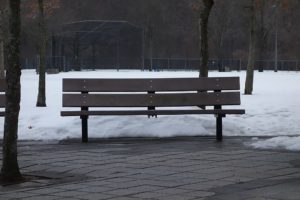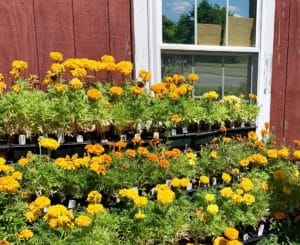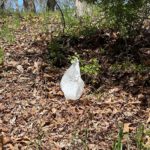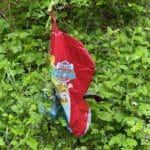Hello fellow readers, Repurposing garden pots and turning plastic bags into benches or composite decks is kind to our environment. Now there are new rules banning single-use plastic and paper bags that put me into a tizzy, which is embarrassing to confess.
A kind conversation with Devin of Race Farm Market in Blairstown, NJ, turned my point of view. From one of frustration restricting paper bags, which are as recyclable as cardboard boxes excessively used in online shopping, to a feeling of encouragement that the changes could be good for our dear earth. After all, not everyone or every town recycles effectively.
Pennsylvania has yet to adopt the program though Philadelphia has, and Pittsburg and a few other municipalities will have laws in place in 2023. New York has had the Bag Reduction Law since 2020 and other states before that.

Plastic Bags made into a Bench Tdorante10, CC BY-SA 4.0, via Wikimedia Commons
A website hosted by the American Recyclable Plastic Bag Alliance (link below) seems to list local legislation searchable by state accurately. As you would guess, they disagree with the bans as “the US plastic bag manufacturing and recycling industry, which employs thousands of workers in 40 US states.” Instead, they encourage recycling and reusing bags.
Recycled Plastic Bags turn into Benches.
While we use them as trash bags or picking up dog waste, decomposable bags are better suited for the task. Many plastic bags end up in landfills, are blown into trees, or clog up the equipment at recycling facilities. But recycled bags are also being put to good use.
The leading composite deck and rail manufacturer, Trex also makes “eco-friendly” outdoor furniture from recycled bags with their NexTrex Plastic Bag & Film Recycling program. And they brag that plastic processing and manufacturing are all done in the United States using “the best available technologies for managing our environmental impacts on air, water, and land.”
Union, NJ, challenged its residents to gather 500 pounds of plastic bags, which is 37,500 bags, that Trex will turn into a free bench for a community park. A win-win! Good promotion for Trex, encouraging recycling of plastic bags, and a place to sit.
Repurposing Garden Pots
The conversation with Devin led to the discussion of recycling and repurposing garden pots. Many trash services do not accept them for recycling because of the plastic used (polypropylene). I loved hearing Race Farm uses pots and trays again, sanitizing them first using good old-fashioned bleach mixed with water.
“It saves us money, plus we share them with girl scout troops and those that wish to start seeds.”
Devin only recycles the plant pots their customers buy from them to avoid spreading plant diseases coming from elsewhere. For example, the tobacco mosaic virus can affect tomatoes, peppers, eggplant, spinach, petunias, and marigolds. The only remedy is tossing plants which can be devastating.
Wisdom on when to plant annuals and vegetables
I asked when folks should plant annuals and vegetables. “Typically, between May 15th and 20th,” Devin explains. But the plants they are selling now are hardened off and can manage the cold. However, buying warm-weather vegetable plants early, like tomatoes and peppers, won’t give you a head start in growth as the cool weather will keep them idle until things warm up.
Tender annuals like impatiens will suffer when temps fall to 40 or below. Were tougher ones like the annual dianthus and snapdragons can better manage the cold. “It can drop to 33 or 34, and they won’t suffer any foliar damage.”
Plant annuals and vegetables after the Flower Moon
Devin shared an old-time adage, new to me. “They say to plant annuals and vegetables after the last full moon in May as it will be the last cold night.”
According to NASA, the full moon in May will be May 16. Fittingly it’s the Flower Moon “because flowers spring forth across North America in abundance this month,” writes the Farmer’s Almanac. (You can jump back to a column about Planting by the Moon archived on AskMaryStone.com)
Devin’s contagious positive outlook comes with wisdom – “We’ve been through so much since the pandemic, following protocols, and learning to do things differently. The bag thing is just one small thing we’ll quickly adjust to.” Yes, indeed, we, like plants, are resilient.
Garden Dilemmas? AskMaryStone@gmail.com (and your favorite Podcast App.)
There’s more to this story in Episode 56 of the Podcast
Link to related story – Planting Following Nature
For more information about the American Recyclable Plastic Bag Alliance, visit bagalliance.org.
and Trex Recycling Nex-Trex Program





